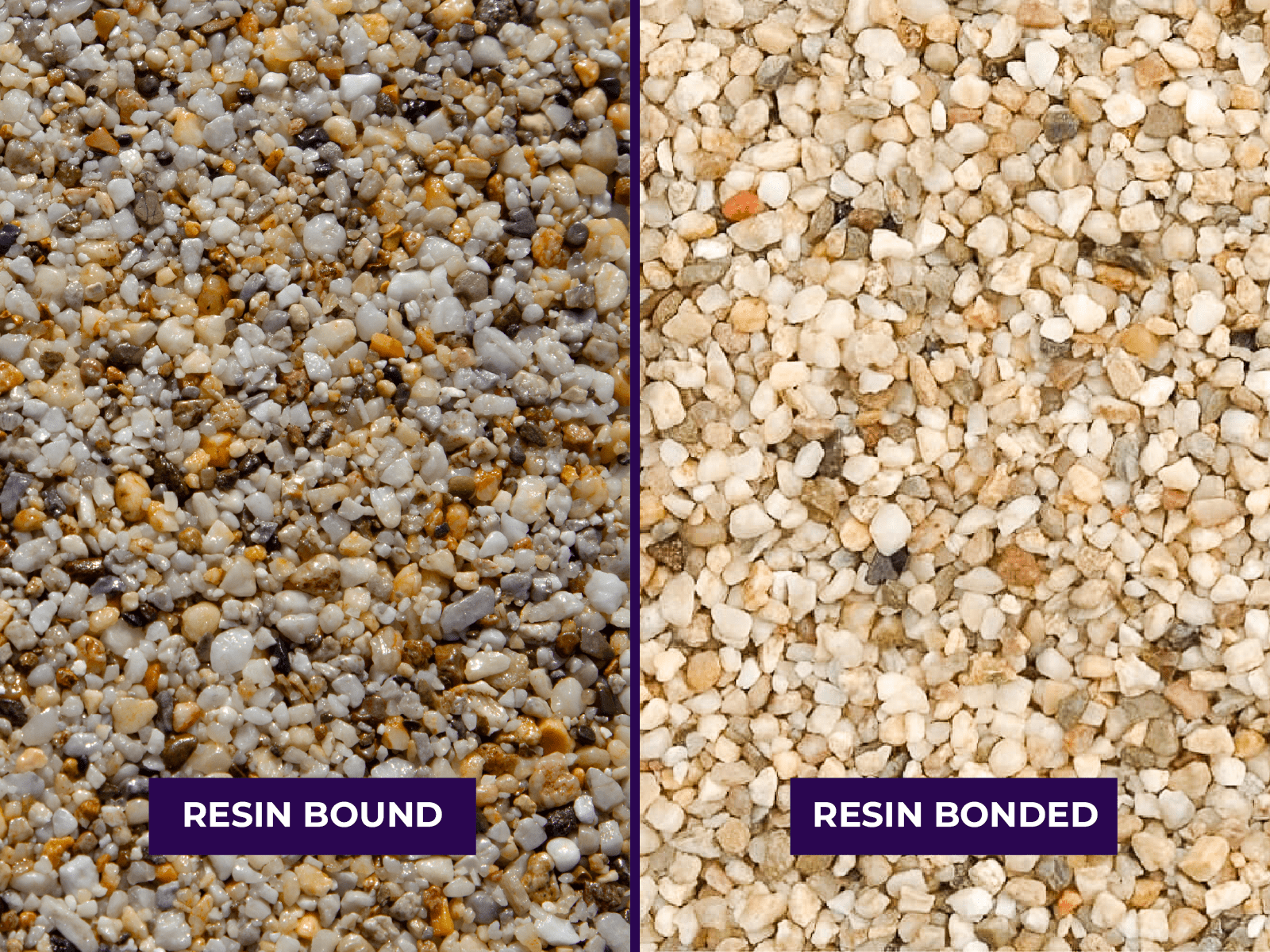Understanding how long a resin driveway takes to cure is essential for both installers and homeowners. Getting this right means:
- You’ll avoid damaging the surface before it’s ready.
- You’ll ensure the surface stays durable and keeps its appearance for years to come.
- You can plan site access with confidence, which is especially useful for clients or commercial installations.
This post breaks down the curing times for resin driveways, what affects them, and how Resin Mill products stack up.
Understanding the curing process
Curing (or drying) time isn’t a one-size-fits-all answer. A range of factors come into play, from weather to materials. Let’s break them down:
- Temperature: Warmer weather speeds up curing. In colder conditions (below 5°C), curing slows significantly and may even stall. You should never install a resin driveway under 5°C.
- Humidity: High moisture levels in the air can interfere with curing. Resin systems perform optimally in dry conditions.
- Installation thickness: Thicker applications take longer to cure, particularly with resin bound installation. Stick to the industry-recommended depths where possible. 15mm for patios and pathways, 18mm for driveways/light traffic, and 20mm for high-traffic areas.
- Colour choice: Darker aggregates retain more heat, often curing faster. Lighter shades can take slightly longer.
- Resin Type: Bound vs Bonded: Resin bound systems (fully mixed) typically require 6-8 hours to walk on and 24-48 hours to drive on. Resin bonded (scatter coat) systems are typically dry/cured in 24 hours and ready to use.
- Resin Mix Ratio: The exact ratio of resin to aggregate matters. Too much or too little resin can delay curing or affect durability. Stick to the advised 4 bags of 25kg aggregates combined with one 7KG resin kit.
- Quality of Resin & Aggregates: Premium materials like those from Resin Mill promote a more consistent and reliable cure.
- Mixing Process: Poor mixing, inadequate time or technique can lead to uneven curing or soft spots. The use of professional tools, including a forced action mixer, can help.
- Use of Catalysts: Installers can add accelerators to the mix to speed up curing, especially helpful in cooler conditions or for fast turnaround jobs. Only use Resin Mill's catalyst if temperatures are between 6°C and 15°C.
Top tip for installers: Always check the manufacturer’s technical data sheet for guidance on catalyst use based on temperature.
When can you walk on a newly installed driveway?
So you've just had your perfect resin driveway installed, but when can you walk on it?
Resin Bound Surfaces
- Pedestrian access is typically safe after 6-8 hours, depending on ambient temperature and humidity.
- In warmer conditions (15°C and above), this may be closer to 6 hours.
- In cooler conditions, always allow up to 8-12 hours before walking to ensure a full surface cure.
- If the installation was completed late in the day and temperatures drop overnight, the curing will be slower. It’s often safer to wait until the following morning before allowing foot traffic.
Resin Bonded Surfaces
- These systems generally cure faster, due to the thinner resin layer.
- Walk-on time can be as little as 3-6 hours in normal conditions.
- However, because the stone is only adhered to the surface, it’s more sensitive to early traffic; always check the bond strength before allowing pedestrian use, especially on cold or damp days.
Additional Tips for Installers
- Test before use: A quick touch test (wearing gloves) can help confirm surface hardness, but avoid walking on it unless fully confident in the cure.
- Protect during curing: Use cones, tape, or barriers to keep people off the surface. Many curing failures happen due to early foot traffic from unaware homeowners, pets, or delivery men.
Avoid foot traffic if rain is forecast within the curing window, as wet surfaces can become slippery and easily damaged.
When can you drive on a newly installed driveway?
Resin Bound Driveways
Because the resin and aggregate are fully mixed and laid in one smooth, permeable layer:
- In ideal conditions (moderate warmth, low humidity), light cars may be safe after 24 hours.
- For heavier vehicles or frequent use, it's best to wait 36-48 hours.
- In damp or cold weather, extending the waiting time 48 hours or more gives better peace of mind.
- Avoid sharp turns or heavy braking on the surface until the surface is fully cured, as this can lead to micro-cracking or stone loosening.
Resin Bonded Surfaces
- Resin bonded surfaces are not designed for vehicle use.

Best Practice Tips for Installers
- Always check surface hardness before allowing vehicles. If the surface yields or feels “soft,” delay usage.
- Use temporary signage, cones, or barriers to block access during the curing window.
- In mixed installations (for example, a resin finish over an existing driveway), delay traffic even longer around edges or transitions.
- For commercial or high-use zones, planning for 48 hours with no traffic is sensible.
|
Material Type |
Walk-on Time |
Safe Vehicle Time |
Notes / Considerations |
|
Resin Bound |
6-8 hours (typical) |
24-48 hours |
Depends heavily on temp & mix quality |
|
Resin Bonded |
3-6 hours |
12-24 hours |
More sensitive to early loading |
|
Block Paving |
Immediate (after laying) |
Immediate / as soon as bedding is set |
Blocks are pre‑formed and interlock; once compacted and infilled, driving is possible |
|
Asphalt / Tarmac |
24 hours |
Several days / up to 3-5 days |
Needs time to cool and reach full strength |
|
Concrete (plain/slab) |
24 hours |
7-10 days (or more) |
Full strength takes weeks; early loading causes damage |
How long before a new resin driveway can get wet?
Rain is the enemy during curing.
- Ideally, no moisture should touch the surface for the first 6-8 hours.
- If rain is forecast, avoid installation altogether; even drizzle can cause blooming or discolouration.
- After 8 hours (and depending on temperature), the surface is usually safe from rain damage.
Installers: Always check local weather forecasts and have canopies or tarps on standby during uncertain conditions.
Resin Mill products
At The Resin Mill, our resin products are engineered for:
- Consistent curing times, even in variable UK conditions.
- High-performance catalysts that can be adjusted depending on the weather.
- Premium Pre-mixed aggregates, reducing the risk of surface defects or colour change within the surface.
- Colour-stable finishes, with no compromise on drying time.
Explore our full resin driveway product range.
Maintenance requirements for longevity
To enjoy the full potential lifespan of 20-25 years of a resin driveway, homeowners should adhere to the following.
- Clean it to prevent moss, weeds, and grime build-up.
- Remove oil or fuel spills promptly.
- Avoid using metal shovels or harsh chemicals in winter.
- Avoid dry steering on the surface.
Find out more about maintaining your resin driveway.
Summary
So, how long does it take?
- Walk on it: After 6-8 hours (Resin bound)
- Drive on it: After 24-48 hours (Resin bound)
- Rain-safe: After approx. 8 hours (if dry curing conditions)
By understanding the curing process and using high-quality materials, like those from Resin Mill, you’ll deliver a professional finish that lasts.
Want to Learn More? Visit Resin Mill's Training Academy
If you’re serious about becoming an expert at laying resin driveway installations, including understanding crucial factors like drying times, curing conditions, and application techniques, we highly recommend Resin Mill’s state-of-the-art Training Academy.
As one of the UK’s leading resin bound suppliers, Resin Mill doesn’t just provide premium materials; they also offer hands-on, in-depth training designed for both beginners and experienced contractors. Everything covered in this blog, from how long a resin driveway takes to dry to the do's and don'ts of installation, is explored in detail as part of the course.
Still need help?
Our team is here to help. Contact Resin Mill today for technical support, product guidance, or to place your next order with the UK's leading resin driveway supplier. Phone 01484 400 855 or email us at sales@resinmill.co.uk
FAQs
What factors affect how long a resin driveway takes to dry?
Several factors influence drying time, including temperature, humidity, and the type of resin used. Warmer, dry conditions allow resin to cure faster, while cooler or damp weather can extend the process. The depth of the installation and airflow around the area also make a difference.
When is it safe to walk on a newly laid resin driveway?
In ideal conditions, around 15–25 °C with low humidity, a resin-bound surface is usually safe to walk on after 6-8 hours. However, Resin Mill recommends always checking the surface first. If it still feels tacky or soft, allow more time before using it. It will generally be safe to drive on after 48 hours.
When is it safe to drive on a resin driveway?
Resin Mill advises avoiding driving on a new resin-bound surface for at least 24-48 hours to allow it to fully cure. In colder or damp conditions, it’s best to wait slightly longer to prevent any damage to the surface before it hardens completely.
Can you install a resin driveway in cold or damp weather?
Installation should be carried out in dry conditions and temperatures above 5 °C. Cold or humid weather can slow down or even stall curing and affect the finish. If rain is expected within 24 hours, it’s better to postpone the installation.
What happens if it rains before the resin has cured?
If rain hits the resin before it has set, it can cause blooming, discolouration, or a patchy finish. Always check the weather forecast and rearrange the installation if rain is expected. Having a tarpaulin available for unexpected rain is also prudent.







Leave a comment
This site is protected by hCaptcha and the hCaptcha Privacy Policy and Terms of Service apply.